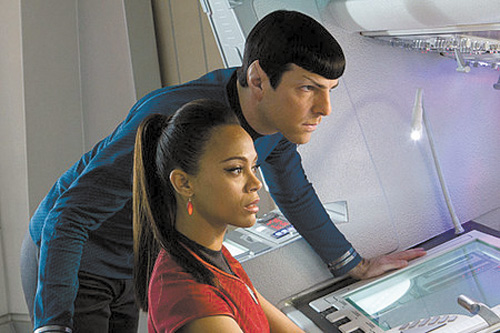Star Trek Into Darkness
Since J.J. Abrams’ “Star Trek Into Darkness” boldly starts with Captain Kirk (Chris Pine) and Doctor “Bones” McCoy (Karl Urban) being chased by spear-throwing natives while Spock (Zachary Quinto) is trapped inside an eruptive volcano on a planet labelled as forbidden by the United Federation Of Planets, the crew of the USS Enterprise literally gets sent back to school. Not for long, however. As soon as a British accented super-villain named John Harrison (Benedict Cumberbatch) makes Starfleet’s London database evaporate, all hands are on deck for a rip-roaring action-adventure loaded with great characters, a strong script, and a little romance, Spock/Uhura (Zoe Saldana) style.
Staying true to the Gene Rodenberry’s allegorical vision of a future moving at warp speed, where each 1960’s TV episode was a morality tale, this newest entry in the Star Trek universe has obvious parallels to some of today’s headline inducing ethical dilemmas. In addition to disobeying the “prime directive” by messing with the fates of indigenous extra-terrestrial life forms, Kirk reacts to John Harrison’s acts of terrorism by chasing him to the no-extradition planet he escapes to, and then launching a drone strike against the villain despite the legal and moral concerns of some of his crew. Just in case you don’t see the parallels, the film is dedicated to “The soldiers who serve in the war on terror.”
For any non-Trekers out there, here is an overview of the live-action theatrically-released films in the series featuring the original ensemble of characters.
Star Trek: The Motion Picture (1979) – Considered the weakest of the movies, Robert Wise ploddingly directed this obvious attempt to cash in on the growing number of dedicated fans of the 1966-1969 TV series created by Gene Roddenberry. It reunited the original crew of the USS Enterprise: William Shatner as the cavalier rule-breaker Captain Kirk, Leonord Nimoy as the half human/half Vulcan but always logical Science Officer Spock, De Forrest Kelly as the exasperated Doctor “Bones” McCoy, and Denise Nichols as the unflappable Communications Officer Lieutenant Uhuru.
The Wrath of Khan (1982) – Ricardo Montalban reprises the maniacal escaped prisoner Khan Noonien Singh from the TV series, and introduces the terra-forming planet-creating Genesis Device, in the Nicholas Meyer directed film that reinvigorated the franchise.
Star Trek III: The Search for Spock (1984) – Leonard Nimoy directs as Kirk’s loyal crew steal the decommissioned USS Enterprise to return to the Genesis planet and retrieve Spock’s body.
Star Trek IV: The Voyage Home (1986) – Nimoy directs one of the best (and funniest) films in the series as Kirk et al fight an Earth-destroying alien probe by traveling back in time to 20th Century San Francisco to retrieve a humpback whale—the only creature that can save our future planet.
Star Trek: The Final Frontier (1989) – William Shatner directs in such a way that the “odd numbered films are okay, but the even numbered films are good” mantra about the franchise is set in stone. The story involves Spock’s half-brother and his obsessive search for God.
Star Trek VI: The Undiscovered Country (1991) – Nicholas Meyer returns to the director’s chair with a tale of escape and daring-do when Kirk and McCoy are arrested and sent to a snow-shrouded prison-planet for assassinating the Klingon High Commander.
The seventh through the twelfth films bear the Star Trek name, but only include a few of the original crew members.
Star Trek (2009) – In this clever re-boot, director J.J. Abrams carefully introduces younger versions of Kirk, Spock, McCoy and Uhuru (all played by new actors) as they tackle the rigorous training of Starfleet Academy, get assigned to their first starships, and eventually end up on the bridge of the newly-commissioned USS Enterprise to fight Romulan-created, planet-destroying, black holes.
Star Trek Into Darkness (2013) – This just-released film is a worthy “even-numbered” triumph for all involved, with some clever homages to characters and situations first explored on TV all those years ago.
Comments? E-Mail gi*********@*****st.net.








